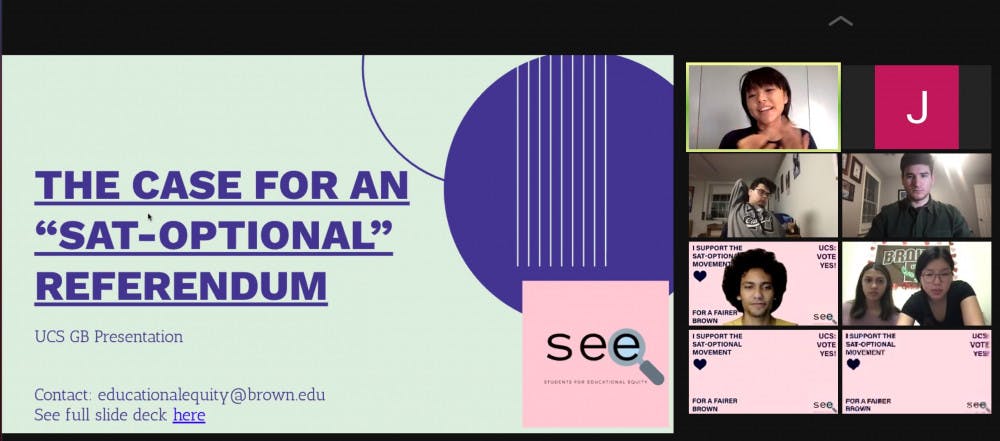Students for Educational Equity at Brown gave a presentation at the Undergraduate Council of Students’ general body meeting Wednesday, Feb. 18 to propose a referendum for UCS’ spring elections ballot. The referendum would ask students about their opinions on the University’s standardized testing policy in admissions.
If the Council votes to add the referendum to the ballot, the referendum would gather student opinions on whether they believe the University should permanently adopt a test-optional policy for its admissions process.
SEE, a student group that works to promote educational equity, introduced the referendum in hopes of making the admissions process more equitable, said Zoë Fuad ’23, lead organizer for the SAT-Optional Campaign, in SEE’s presentation to UCS.
“Years of research have shown us consistently that standardized testing creates, contributes to and exacerbates existing inequities, disadvantaging students who identify as BIPOC, first generation and/or low income,” she said.
SEE’s presentation was attended by members of the group as well as students not involved with SEE or UCS. Students who came to support the group put a poster urging the Council to vote yes on the referendum as their Zoom backgrounds.
The referendum is being introduced at a unique time in the University’s history, Fuad said. Due to the pandemic, many universities, including Brown, have gone temporarily test-optional, something some universities previously claimed was impossible, she added. SEE hopes to capitalize on the current evidence that it is possible and push the University to consider going test-optional permanently.
“It’s problematic to have (standardized tests required) in the first place. It’s almost unforgivable for a school to actively decide to implement what they know to be a harmful policy when there are clearly better alternatives out there,” Fuad said.
She added that a large number of admissions offices throughout the country at universities that have not gone test-optional face the challenges of being understaffed and underfunded.
The SAT and ACT are fast and easy ways to sort through the increasing numbers of applications universities are receiving, Fuad said. But she also noted that if “Brown wants to make this happen, they can,” citing peer institutions like the University of Chicago that have successfully transitioned into test-optional admissions processes.
SEE has gathered verbal and written support for a test-optional policy from faculty, student groups, alumni and two members of the Corporation. But to get a broader base of support, the group needs to demonstrate that students at the University are in support of the policy, Fuad said.
If it is placed on the Council’s spring ballot, the referendum would be an effective way of capturing student opinion, which Fuad said would help SEE gain institutional support.
“We think it’s important that students have a seat at the table, which is the other reason we think it’s very crucial for us to have this vote,” she said.
Chair of Campus Life Zane Ruzicka ’23 expressed support for adding the referendum to the ballot. Student opinions about the University’s standardized testing policy would be “really eye-opening for the admissions process and how it should look,” he said.
UCS will open internal voting on whether to add the referendum this week and will close the poll at its general body meeting next Wednesday, Feb. 24. The vote must pass by a two-thirds majority in order to be placed on the spring ballot.
Also at the meeting, Council Parliamentarian Zanagee Artis ’22 presented a guide to internal UCS voting rules. The guide, which was written by Artis and Elaine Wang ’24, details the types of voting the Council can enter into and what each type entails. Artis noted that the guide can serve as a “resource” and “living document” for future use.

ADVERTISEMENT




